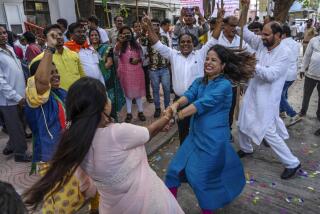Violence erupts over Kenya vote
- Share via
NAIROBI, KENYA — Machete-wielding youths rioted in Kenya on Saturday as each party vying for the presidency declared its candidate the winner, threatening an election that was initially praised by international observers.
In early results, challenger Raila Odinga had led President Mwai Kibaki by several hundred thousand votes, but by late Saturday, Odinga’s lead had dwindled. Amid opposition accusations of fraud, riots exploded in several cities.
In Odinga’s strongholds, supporters from his Luo tribe looted businesses and set fire to shops and houses belonging to Kikuyus, the tribe associated with Kibaki.
Police fired tear gas as youths rioted and chanted anti-Kikuyu slogans in the Kibera slum area of Nairobi after Odinga’s lead was whittled down in an election that is crucial to consolidating this East African nation’s young democracy.
There also was mayhem in Kisumu, on the shores of Lake Victoria in western Kenya, the Reuters news agency reported. Police battled rioting opposition supporters, who looted shops and burned buildings.
At least one person died in the violence in Kisumu, and the Associated Press reported that three people had been fatally shot in election violence in the southwestern town of Migori.
Violence also was reported in the coastal town of Mombasa and elsewhere.
Late Saturday, the Electoral Commission of Kenya put Odinga’s lead over Kibaki at only 38,000 votes, with 191 of 210 constituencies counted.
The latest tallies were 3,880,053 for Odinga and 3,842,051 for Kibaki.
Earlier, Odinga had racked up a substantial lead. The opposition Orange Democratic Movement had declared him the winner and called on Kibaki to concede.
“In view of the growing anxiety and restlessness in the country over the extended delay . . . we now call upon the outgoing president to acknowledge and respect the will of the Kenyan people and concede defeat,” said Musalia Mudavadi, the party’s candidate for vice president.
Kibaki’s Party of National Unity countered by releasing its own count, putting the president ahead and declaring him the winner.
Kenya’s last presidential election, in 2002, was seen by analysts as its first real democratic vote, though multiparty elections were reintroduced in 1992. If Kibaki loses, it will be the first time an incumbent president has been voted out in Kenya, and one of only a few cases in sub-Saharan Africa.
Black smoke hung over Kibera and flames shot into the air as youths rampaged Saturday, destroying Kikuyu property. Burned tires, charred planks of wood and sheets of iron littered the road.
Opposition supporters were breaking up kiosks, shouting, “No Raila, no Kenya; no Raila, no peace!” and “Kibaki must go!” Police pursued them along the narrow alleys with guns raised.
“They are delaying the results to steal, and we all know that,” said one of the protesters, George Otieno, 33. “There is a plan and it’s to return Kibaki to State House, and that will not happen,” he said, referring to the presidential residence. “We voted peacefully, and we should get fair results.”
A woman was slumped against the open door of a white saloon car, weeping after youths armed with pangas, or machetes, burned down her clothing kiosk and stole all her stock.
“They came as we were fetching water at the market, and started saying, ‘Kikuyus must go to Othaya,’ ” said Theresia Wanjiru, 29, weeping, referring to Kibaki’s home village in central Kenya. “They almost cut us with pangas.
“Why?” she wailed. “What wrong have we done? Who have we wronged, what crime have we committed?”
Tensions rose after Odinga took a strong lead in unofficial counting that was announced on television Friday and Kibaki later began to close the gap as the count dragged on, fueling opposition suspicions that the vote was being rigged.
In the lead-up to the election, the opposition accused the government of preparing to rig the vote, a claim Kibaki strongly denied.
Kibaki’s party said the president was gaining in the count as votes from his key strongholds came in.
Scuffles broke out at a packed Electoral Commission briefing to detail the official counting, as party representatives jeered and demanded to know why the count was taking so long.
Both parties called on the panel to speed its count, but commission chief Samuel Kivuitu declared that he would not be rushed.
“I can’t give what I don’t have,” he told journalists and party representatives. Pressed to release results, he said, “Nobody can push me, not even you!”
He suspended further release of results and said the commission would examine claims of rigging, including a race for one seat in which the votes counted added up to 115% of eligible voters.
Kenya was ruled for nearly four decades by the Kenya African National Union, 24 of those years under then-President Daniel Arap Moi, who tortured and imprisoned political opponents, including Odinga. Kibaki won power in 2002, when Moi was constitutionally barred from running.
In the last five years, Kibaki has delivered economic stability, free primary education and average 5% annual economic growth, but opponents say he has failed to fight corruption.
Odinga, a businessman who campaigns in a red Hummer and styles himself as the champion of the poor, has promised to distribute wealth more equally.
--
--
Special correspondent Soi reported from Nairobi and Times staff writer Dixon from Johannesburg, South Africa.
More to Read
Sign up for Essential California
The most important California stories and recommendations in your inbox every morning.
You may occasionally receive promotional content from the Los Angeles Times.










